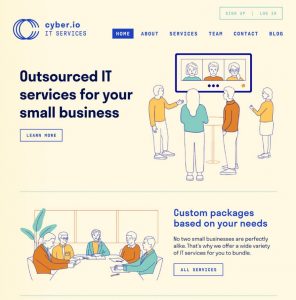The pandemic and resulting lockdowns made it clear that the remote workforce is a valuable resource. Employers were forced to get their teams working from home immediately and it’s no secret that a lot of companies got off to a rocky start. Once things clicked into place, however, employers and employees alike quickly realized exactly how powerful this approach could be.
Facebook announced that half of their workforce will be working remotely ten years from now. As a matter of fact, many companies are keeping their remote business model because of all the benefits involved. Small business owners, especially, are in a great position to leverage virtual assistants to create an unfair advantage over their competitors.
First and foremost, trying to keep up with the day-to-day tasks while hoping to scale your business at the same time makes for a lot of late nights. When you hand off your everyday tasks to a virtual assistant, that’s going to change. No more working late into the night only to be back at it again before sunrise! That makes a huge difference in your level of productivity—actually it makes a huge difference in your life overall!
Virtual assistants take over the daily operations necessary to keep your business organized. You’re left free to focus on the bigger picture which is scaling your business.
You discovered a game changer—run with it!
It’s important to keep your key employees focused on the tasks that best utilize their strengths rather than wasting their time keeping up with mundane tasks. They need to zero in on the tasks that are core to your business. Any strategic planning, for example, would best be handled by your key team members.
When you need to add employees to your workforce in the future, decide whether or not to hire a virtual assistant rather than an on-site employee. Begin by outlining the specific tasks that the job will entail. Will it be lower level office tasks? A virtual assistant could handle them for you.
Determining what to hand off
If you’re a small business owner who has decided to pass some of your daily office tasks to a VA, you may not feel comfortable handing over everything at once. Decide which task is the most time consuming and start there.
Some tasks that virtual assistants perform include:
- Calendar management—This includes coordinating and scheduling calls and appointments, confirming appointments, providing necessary reminders, and rescheduling appointments.
- Email and contact management—Use virtual assistants for screening emails, adding people to contacts, updating contact information, and adding contacts to your customer relations management (CRM) system.
- Phone tasks—A virtual assistant could handle light receptionist duties and transcribe voicemail messages.
- Business development—VAs could take over researching leads, locating email addresses, or even designing presentations.
- Management tasks—Assembling reports, gathering data, or even screening LinkedIn profiles to discover prospective employees can all be handled virtually.
- Day-to-day operations—You need to free up your time—and that of your key players—to focus on the future of your business. Virtual assistants can easily handle your day-to-day tasks, such as setting up projects in the project management system, data entry, scheduling social media posts, converting files, and file management.
Robert Nickell, founder of Rocket Station, a leader in the remote workforce industry, shared this tip. “A good rule of thumb when deciding whether or not to hire a VA is that if the task can be completed on a computer or over the phone, a virtual assistant can take care of it.”
Keep these tasks hands-on
You’ll want to keep close tabs on anything that is essential to growing your business. In part, those would be the tasks that core team members perform that enable your business to maintain a stellar performance record in the industry.
Are you already ticking them off in your head?
Let’s take a broad look at where you should utilize the strengths of your key employees.
- Core competencies—The things that make your business stand out in the industry should be handled by your core team members. For example, any strategic planning involving changes to a procedure or daily operations would be something for your most trusted employees to handle—for obvious reasons!
- Don’t pass off your problem areas—If you’re struggling with an area of your business, don’t blindly hand it to a third party without resolving if first. Doing so is unlikely to solve the problem. Ensure that your virtual assistants have a documented process in place to follow rather than hiring someone who merely says they have a solution for you. That doesn’t bode well from the start.
- Never outsource termination management—A good boss delivers both good and bad news in person. If you’re faced with letting several people go due to unforeseen circumstances, it’s acceptable to consult with an outside expert. They can assist you in determining how best to handle that situation.
Keep your head in the game
As Nickell said above, any task that can be performed on a phone or by computer can be completed by a virtual assistant—with the right set of skills—located anywhere in the world.
Some employers prefer to hire their own virtual staff by advertising on job boards. Others use agencies like Rocket Station that provide employers with experienced assistants who possess the needed skill sets to perform the job.
Some virtual assistance agencies staff their company with VAs from the United States and others hire their workforce from foreign countries. India and the Philippines are the largest providers of virtual assistants, and employees who are hired from these developing nations are often extremely grateful for the opportunity to better their lives.
Your company will benefit from their gratitude.
“We hire all of our VAs in the Philippines,” Nickell said. “Jobs are hard to come by there and it feels good knowing we’re making lives better. We currently employee 800+ people and are on track to scale to 1,000 by the end of 2021.” Nickell continued, “Today, the average Filipino citizen earns approximately $ 929.90 per month. The hourly pay rate for a virtual assistant ranges between $ 4 and $ 9 an hour. Our employees have the opportunity to surpass the monthly average when they possess a wide range of skills and speak impeccable English.”
Many employers shy away from hiring overseas VAs because they fear facing a language barrier. However, that’s no longer a realistic deterrent because the majority of overseas VAs speak English and, often, other languages as well.
Ultimately, it’s not hard to create an unfair advantage when you decide to hire virtual assistants. Hiring them is really all it takes because it frees you up to get about the business of scaling. Of course, every employer out there has the same window to success opened that you do. They just haven’t chosen to make the change for the better.
You, on the other hand, are going to see a positive impact on your company when you hire virtual assistants. For starters, production levels increase, overhead costs go down, and you don’t have to worry about losing an employee if they move out of the area.
The virtual workforce will continue to grow because they’ve proved themselves able to focus on the task at hand—make it yours!
Business & Finance Articles on Business 2 Community
(55)
Report Post






